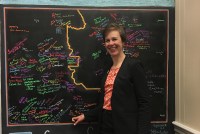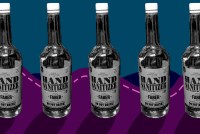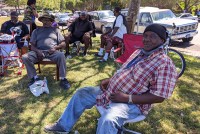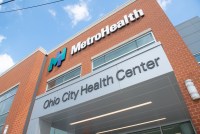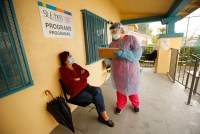Latest KFF Health News Stories
Public Health Officials Face Wave Of Threats, Pressure Amid Coronavirus Response
Public health officials are confronting growing pressure — and threats — across the country as the backlash to the coronavirus response continues. At least 27 state and local health leaders have resigned, retired or been fired since April across 13 states.
Si perdiste tu seguro de salud por la crisis de COVID-19, tienes opciones
Algunos pueden adquirir un seguro de salud bajo ACA apelando a un período especial de inscripción. Otros descubren que pueden aplicar para Medicaid. Hay alternativas pero el tiempo corre.
If You’ve Lost Your Health Plan In The COVID Crisis, You’ve Got Options
But some of those options, like special enrollment periods, are time-sensitive.
Health Workers Resort To Etsy, Learning Chinese, Shady Deals To Find Safety Gear
The shortages are so dire that nursing homes and other health centers are going to extraordinary lengths for masks, gowns and essential materials.
COVID-19 Batters A Beloved Bay Area Community Health Care Center
Health clinics in isolated African American communities in the San Francisco Bay Area provide crucial services to neglected populations. But like thousands of other community clinics around the nation, their finances have been wrecked by the pandemic shutdown.
KHN’s ‘What The Health?’: Say What? The Spread Of Coronavirus Confusion
Months into the COVID-19 pandemic, the public seems more confused than ever. And health officials still are not all on the same page; this week the World Health Organization had to walk back an official’s statement about how commonly the virus is spread by people without symptoms. Margot Sanger-Katz of The New York Times, Paige Winfield Cunningham of The Washington Post and Mary Ellen McIntire of CQ Roll Call join KHN’s Julie Rovner to discuss this and more. Also, Rovner interviews Michael Mackert, a professor and health communications expert at the University of Texas-Austin, about how health information can best be translated to the public.
Using Stories To Mentally Survive As A COVID-19 Clinician
The practice of narrative medicine helps health care professionals hear the life stories behind a patient’s immediate complaints. Some doctors are finding that these skills also provide an alcove of needed reflection amid the pandemonium of COVID-19.
Fighting COVID And Police Brutality, Medical Teams Take To Streets To Treat Protesters
Off-duty medical professionals joined protests in Denver and elsewhere sparked by George Floyd’s death to treat injured protesters, risking injury themselves.
At-Home Care Designed For COVID Likely Here To Stay At Cleveland Hospital
A public hospital in Cleveland has been trying to keep COVID patients out of its beds. It tried a number of innovations for developing better communication — even better relationships — with patients. Officials think this groundwork helped keep the outbreak at bay — and should be the new business model going forward.
New Coronavirus Hot Spots Emerge Across South And In California, As Northeast Slows
Nationwide, coronavirus infection numbers are trending down, but several states are seeing upticks, with the heaviest impact falling on communities of color and nursing home residents.
Elevadores en tiempos de COVID-19, un desafío de la vuelta al trabajo
La mayoría de los ascensores son espacios estrechos y cerrados donde apenas caben dos personas si se quiere mantener una distancia de 6 pies para prevenir la propagación del coronavirus.
The Elevator Arises As The Latest Logjam In Getting Back To Work
As more and more people drift back into their workplaces, they face a very small space that can create a large logjam: the elevator.
At Lake Of The Ozarks, It’s (Almost) Business As Usual, Despite The Coronavirus
This popular resort area gained national attention for a viral video showing Memorial Day partiers disregarding guidelines to curb the spread of the coronavirus. Now, with summer looming and at least one COVID-19 case connected to the gathering, it reflects the difficult balance between safety and tourism.
For EMTs, There’s No ‘Rule Book’ For Facing A Pandemic And Protests At Once
Emergency medical technicians, who have been on the front lines against the coronavirus, also play a key role in helping provide care during protests sparked by the death of George Floyd.
Baltimore’s ‘Squeegee Boys’: ‘If We Don’t Go Out, We Don’t Eat’
The federal government’s relief package left behind many of America’s poorest workers struggling to make ends meet as the coronavirus ravaged and unemployment rose. Baltimore’s “squeegee boys” are among them.
Tear-Gassing Protesters During An Infectious Outbreak ‘A Recipe For Disaster’
Health researchers are among the voices calling for police to stop using tear gas and pepper spray on protesters, because these chemical irritants can damage the body in ways that can spread the coronavirus and increase the severity of COVID-19. One example: Tear gas and pepper spray can sow confusion and panic in a crowd, causing people to rip off their masks and touch their faces, leading to more contamination.
Tirarle gas lacrimógeno a manifestantes en medio de la pandemia es un “desastre”
Su uso generalizado, mientras que una enfermedad infecciosa, para la cual no hay vacuna, continúa propagándose en los Estados Unidos, ha sorprendido a expertos y médicos.
KHN senior correspondent Jordan Rau takes a spin through this week’s essential health care news.
COVID-19 Overwhelms Border ICUs
Some California hospitals near the Mexican border have received so many COVID-19 patients the past few weeks that they have had to divert some to other facilities. Hospital officials say most of the infected patients are U.S. citizens or legal residents who live in, or recently traveled to, Mexico and came to the U.S. for care.
Montana’s Tribal Nations Preserve COVID Restrictions To Preserve Their Cultures
Some of Montana’s Native American nations are holding firm on coronavirus protections even as the rest of Montana reopens. They’ve got more at stake, they say, in protecting their elders who preserve their endangered culture.



